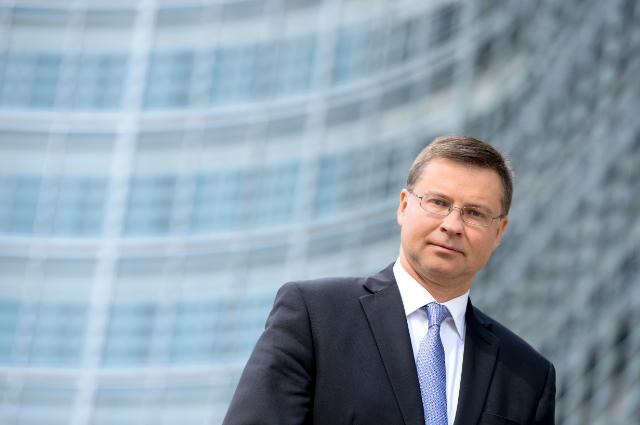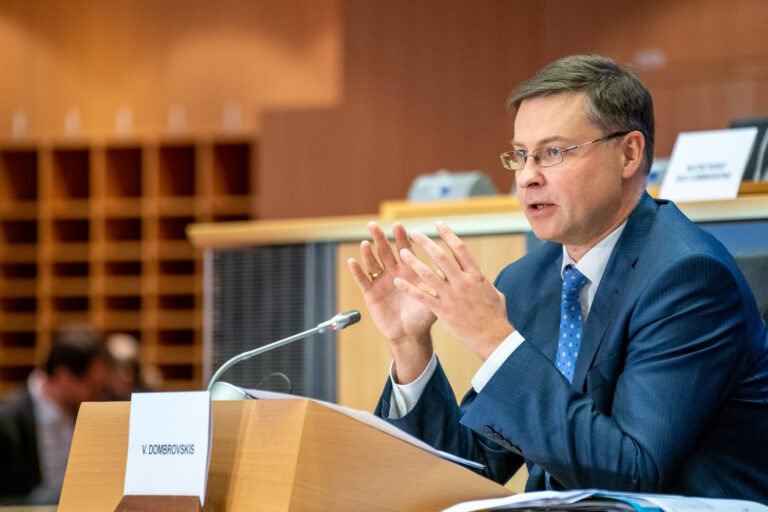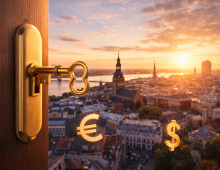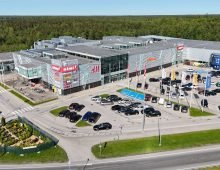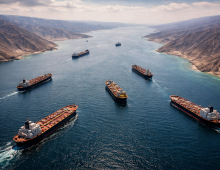Valdis Dombrovskis, European Commission Executive Vice-President and Trade Commissioner, currently on a visit to Lithuania, says that subsidies requested by Lithuanian politicians and Ukrainian farmers for the transport of grain through Klaipeda and other European ports are not being considered in Brussels.
However, the Commission, according to him, is looking at ways to reduce the cost of transporting grain by addressing procedural or infrastructure problems.
“There is financing available for addressing specific bottlenecks in the functioning of solidarity lanes. So from that point of view, yes, there is some financing available. But we are currently not discussing kind of just subsidizing the transport cost,” Dombrovskis told BNS in an interview.
“Rather, we look what can be done to bring down transport costs through targeted administrative or infrastructure improvements,” he added.
However, Dombrovskis said the Commission supports Lithuania’s proposal to move customs formalities, phytosanitary checks and other procedures from the Ukrainian-Polish border to Community ports such as Klaipeda.
In July, Lithuania’s Foreign, Transport and Communications and Agriculture Ministers sent a letter to EU officials, also to you, in which they called on the European Commission to strengthen Ukraine’s alternative grain export route through the Baltic States. What, in your opinion, are the perspectives and possibilities of this route?
Indeed, this is a topic on which we are intensively working in our joint coordination platform and also bilaterally with member states and with Ukraine itself. Maybe to provide overall picture on the [so-called] solidarity lanes, and the main corridor for solidarity lanes is Danube Corridor now. And the aim is to reach a capacity of 4 million tons [of grain] per month by the end of the year. And the estimate for Ukraine export needs is 4.7 million tons per month in the next 12 months and actually maybe even slightly higher.
So clearly we also need to look at this Polish and Baltic States corridor. So it’s part of these solidarity lanes and we are also looking how to address the specific bottlenecks, too, to facilitate the use of this corridor. For example, a concrete proposal from Lithuania was to move the customs and phitosanitary controls to Baltic States’ seaports.
And what do you think about this proposal?
From the Commission’s side, we are supportive of this and also looking for other concrete improvements, which can be done. Of course, we must acknowledge, that logistically it’s a relatively difficult corridor because the railway gauge in Ukraine and in Poland and in Lithuania again, is different. And this adds to the costs and logistical difficulties. But there are certain things how we can improve the functioning of this other direction, and that’s what we are working on.
How these logistical obstacles, which you mentioned, could be solved?
As I said, of course, we are currently not in a position to rebuild railways and … of course, a more strategic Rail Baltica project. These are not short-term solutions. So in the short term, we are looking more at some procedural bottlenecks which can be streamlined like the ones I mentioned before, and also at some targeted infrastructure capacity improvements, which can be done.
Lithuanian Transport and Communications Minister Marius Skuodis has said that shipping of Ukrainian grain through the Lithuanian port of Klaipeda is not only a logistical, but also an economic issue, which requires financial assistance from the European Union. Does the European Commission intend to provide any financial assistance or subsidies for the transport of grain through Klaipeda and other Baltic ports?
I think we need to distinguish between two things. So there is financing available for addressing specific bottlenecks in the functioning of solidarity lanes. So from that point of view, yes, there is some financing available, but we are currently not discussing kind of just subsidizing the transport cost. Rather we look what can be done to bring down transport costs through targeted administrative or infrastructure improvements.
One of your responsibilities is trading partnership with China. What perspectives do you see in this area, I mean, in economic relations between the EU and China? What measures are going to be proposed by the European Commission in this area in the nearest future?
As regards China, China is EU’s second largest trading partner and we have very complex relationships with China. As I say, we have China as a cooperation partner in some areas, like, for example, if you discuss fight against climate change, obviously we need to have China on board as the world’s biggest emitter. Then we have China as an economic competitor, but also in some areas as a systemic rival because China is promoting a different socio-economic model. So we need to navigate all this complexity.
Recently, the focus has been on what’s called a de-risking of our relationships and working on ensuring diversified and resilient supply chains for the EU, including in the area of critical minerals, for example.
And also more specifically in the case of China, we know that we also have many trade irritants and all in all, our economic relationship is unbalanced with the EU running almost 400 billion euros trade deficit [with China].
So all those topics are the ones which I’m also going to raise with my Chinese counterpart when I will be in China this month for high-level economic dialogue.
What is your and the Commission’ opinion about Lithuania‘s strict or tough stance on China? How does it look in Brussels?
As you know, the EU supported Lithuania when Lithuania was facing this economic coercion from China. So we have initiated a WTO case against China and in between a panel has been set up. So we now need to wait for the panel proceedings. And in between, we have also finalized the work on so called anti-coercion instrument, which would provide EU for a faster and more efficient way to react in cases when the EU or some member states are faced with that kind of economic coercion.
During your visit in Lithuania you are going to discuss the difficulties faced by business in the Baltic States in raising capital. Could you give more details what challenges and difficulties you see in this area and how they should be overcome?
First of all, obviously, it’s part of our work on the Capital Markets Union, where one of the focus areas is developing capital markets also in smaller member states, and in countries where there are smaller capital markets. And in the case of the Baltic States, the Commission has been very supportive of setting up a regional Baltic Capital Market initiative because we think it’s important for us to achieve a degree of scale.
There are also questions of geopolitical risks, which we see that investors are factoring in, for example, in their investment decisions regarding the Baltic States, also other Central and Eastern European countries. So we’re also looking how to mitigate this and also how those countries can use available EU funding, including the Cohesion Fund, including the Recovery and Resilience Facility, or, more recently, the REPowerEU initiative, so as to ensure that the economic development in these countries can continue.
My next question is related to energy. How did European Commission and you, as a Latvian citizen, look to recent disagreements between the Baltic States over the date of synchronization of their electricity grids with Western Europe?
I would rather talk about recent agreements, because what I know is that the Baltic States have agreed to actually forward de-synchronization from Russia’s system and synchronization with the European system to February 2025, instead of the end of 2025. So, there’s been agreement to accelerate this timeframe. And from the European Commission’s side, we are supporting it and not only politically but also financially. It [synchronization] has been an important part of so-called BEMIP – Baltic energy market integration plan.
When neighboring countries are engaging in large infrastructure projects, interconnection projects, there are often some kind of disagreements. What is important, that there is dialogue and countries find a way to bridge those disagreements. And often the European Commission is willing and able to facilitate that.
The European Union’s rules of fiscal discipline, which mean that the budget deficit must not exceed 3 percent of GDP, will come back into effect next year. How will this affect the budgets of European Union member states, including Lithuania?
The European Commission has already provided fiscal guidance for 2024. And generally speaking, we put emphasis on the need for more fiscal discipline in this high inflation environment, because our assessment is that fiscal stimulus now would not stimulate economy so much as it would stimulate inflation more. And as a result it will force the ECB to do even further monetary tightening. So it may be even counterproductive.
So therefore, we call on member states to work towards reduction of budget deficits. I would say in the case of Baltic States it’s especially relevant, given the fact that the Baltic States have been facing one of the highest interest rate increases, also for sovereign lending, due to geopolitical risks. So it’s important that Lithuania, like other countries, is now following the fiscal guidance.
And the last question, not about economics or politics. Did you watch any matches of Latvia’s national basketball team in the ongoing championship? Are you happy with Latvia’s national basketball team performance?
Well, obviously, it has been a positive surprise. I have been watching the matches and I would say each game there was more and more excitement. Well, unfortunately, Latvia like Lithuania didn’t make it to the semifinals. But still, it was a very impressive performance. And the same I can say about the Lithuanian team.
Source: BNS.
(Reproduction of BNS information in mass media and other websites without written consent of BNS is prohibited.)

